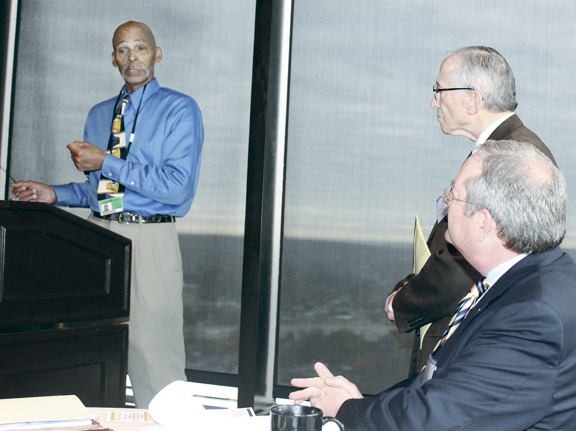Jewish Community Relations Council partners on reentry hiring

Photos and Story by Marshall Weiss, The Dayton Jewish Observer
“God has allowed me to have a second chance at doing the right thing — being a respectable citizen in society, and not taking anything for granted,” Eric McCorry tells employers from Dayton’s Jewish community over breakfast at the Dayton Racquet Club.
“It’s made me a very humble person because I’m so grateful for the opportunities to get myself back in order,” he says, welling up with tears. “I don’t sit and cry the blues about where I’ve been. I try to inspire other people who want to get their lives back in order.”
McCorry is a graduate of the Reentry Career Alliance Academy, a program of the Montgomery County Office of Ex-Offender Reentry.
The Nov. 4 breakfast marked the Jewish Community Relations Council’s formal entry as a partner in the county’s reentry programs.
According to retired Vandalia Municipal Court Magistrate Bonnie Beaman Rice, chair of JCRC’s Chai-er Project, its aim is to encourage employers in the Jewish community to consider hiring ex-offenders who have gone through the county’s reentry academy program.
Rice’s husband, U.S. District Court Judge Walter H. Rice, and Montgomery County Commissioner Debbie Lieberman co-chair the Community-Wide Reentry Task Force.
“I see the faces of their families who show up at their graduations,” Bonnie Beaman Rice says of academy participants. “And what a mighty, mighty example that parent is setting, that you can turn a life around and contribute to society. This program reaches into the next generation, and the generation after that.”
Walter H. Rice describes the reentry program as “the best public safety measure to come on the scene in all of my time here in Dayton.”
“If a person is helping himself, and open to receiving help from the community, if the community is lending a helping hand instead of the back of the hand, then that person is working, he’s paying taxes, he’s raising a family, he’s a role model for his community, and he or she is not out committing additional crimes.”
Approximately 1,500 ex-offenders return to Montgomery County each year.
The judge and Lieberman launched the reentry task force 10 years ago. Five years ago, the county opened its ex-offender reentry office.
According to John Theobald, assistant to Montgomery County Commissioner Debbie Lieberman, Montgomery County had a 44 percent recidivism rate in 2005.
“Today, our recidivism rate is 27.5 percent,” he tells the gathering, referring to the rate of ex-offenders who return to prison.
For those ex-offenders who participate in the county’s three-week Reentry Career Alliance Academy program, Theobald estimates the recidivism rate is at 18 percent.
To date, 115 ex-offenders have graduated from the Reentry Career Alliance Academy this year.
“Seventy-five percent of participants in our program are being successfully placed in mainstream employment opportunities,” Theobald says.
The ex-offenders who enroll in the academy learn about financial literacy, credit management, how to relieve stress in the workplace and in the family, and the importance of contributing to the community.
Theobald says academy participants voluntarily submit to drug testing as they go through the program.
“We will not recommend a returning citizen for a job with any employer if they can’t demonstrate long-term, continual drug screenings,” Theobald says.
Those who don’t have clean drug screenings or decline the voluntary testing are connected to services to help them with addiction and substance abuse issues, he adds.

“It’s been tremendously successful with the reentering population but we also know it’s not for everyone. It’s only for those who are committed to making positive change in their lives.”
Bruce Feldman, president of Economy Linen, says his company began hiring ex-offenders 15 years ago. Last year, approximately 37 percent of the employees Economy hired in its plant were ex-offenders.
“But like any business that has a good idea that starts at the top, we need strong, great people to help implement it,” Feldman says.
He cites his vice president of human resources, Kelly Saliba, for making the program work at Economy.
Pros and cons
“People of all walks of life can make mistakes,” Saliba says. “Their ability to recover from mistakes, to a large extent, is based upon the work ethic of each individual.”
She says the turnover rate and length of retention at Economy are the same for ex-offenders as non-offenders.
“However we have found that they are very appreciative of the opportunity to be gainfully employed,” she says. “They don’t always get that next opportunity or that second chance.”
The only challenge Saliba says Economy has experienced in hiring ex-offenders is a drop-off in commitment when some ex-offenders have met their legal obligation to be employed.
“But we always have to be reflective of that, and think what we can do to improve that situation,” she says.
Saliba adds that in addition to the guarantee of drug-free employees entering the workplace and federal bonding, the reentry program offers up to $2,400 in federal Work Opportunity Tax Credits for each ex-offender a company hires, as well as possible state tax credits, depending on the category of employment.
“Only you can decide if hiring ex-offenders is right for your business,” she says. “We have found that it certainly provides much more opportunities than it does challenges. Recruitment and retention are some of the biggest challenges in business today. There are more positions than there are people to fill them. So in a lot of ways, they (ex-offenders) are a very untapped labor market.”
Walter H. Rice says that from his experience, employers are reluctant to hire ex-offenders because they are concerned about liability and insurance risks.
“There have been changes in Ohio law,” he says. “There is legislation, there are processes that limit if not eliminate your risk vis a vis members of the general public.”
Jewish perspective
Rabbi Bernard Barsky, now retired from Beth Abraham Synagogue, became involved with the reentry task force a decade ago. He serves on the Reentry Office Policy Board and volunteers with the Montgomery County Jail Chaplaincy Ministry.
From a Jewish perspective, he considers the county’s reentry program “as important as anything I’ve ever done.”
“I’ve met so many righteous humanitarian heroes who have humbled me by their service, and who have enriched my life and my faith: my faith in God, and my faith in people,” he says of reentry staff and volunteers.
“We have found the power to break the yoke,” he tells the gathering, referring to the prophetic vision of Isaiah.
“Our tradition insists that the goal of punishment is teshuvah, repentance. The prophet Jeremiah said, ‘Return, my backsliding children.’ And in the interpretation of our rabbis, that means that any criminal who sinned and then repented, we accept that person forever.”
To read the complete December 2015 Dayton Jewish Observer, click here.





